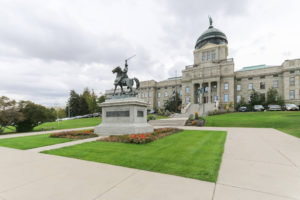Generally speaking, it may help to think of public accommodations as most (but not all) businesses or buildings that are open to (or offer services to) the general public. More specifically, the definition of a “public accommodation” can be broken down into two types of businesses / facilities:
- Government-owned/operated facilities, services, and buildings
- Privately-owned/operated businesses, services, and buildings
Government-owned/operated facilities and services
Government-owned facilities include courthouses, jails, hospitals, parks, and other places owned and  operated by federal, state and local government. Government-operated services, programs, or activities provided by federal, state, or local governments include transportation systems and government benefits programs (such as welfare assistance).
operated by federal, state and local government. Government-operated services, programs, or activities provided by federal, state, or local governments include transportation systems and government benefits programs (such as welfare assistance).
Privately-owned/operated businesses and buildings
Privately-owned businesses and facilities that offer certain goods or services to the public – including food, lodging, gasoline, and entertainment -are considered public accommodations for purposes of federal and state anti-discrimination laws. For purposes of disability discrimination, the definition of a “public accommodation” is even more broad, encompassing most businesses that are open to the public (regardless of type).
Laws Prohibiting Discrimination in Public Accommodations and Disability Discrimination
At the federal level, the Americans with Disabilities Act prohibits discrimination on the basis of disability in a wide range of places of public accommodation, including facilities that offer lodging, food, entertainment, sales or rental services, health care and other professional services, or recreation. State and local governments must eliminate any eligibility criteria for participation in programs, activities, and services that screen out or tend to screen out persons with disabilities, unless the government can establish that the requirements are necessary for the provision of the service, program, or activity. In addition, public facilities must ensure that individuals with disabilities are not excluded from services, programs, or activities because buildings are inaccessible.
Contact a Great Falls Discrimination Attorney Today
Our mission is to provide the members of our community with legal service they can trust. To contact a discrimination attorney, call 406-727-8494 or contact our firm online and schedule your free consultation today.
